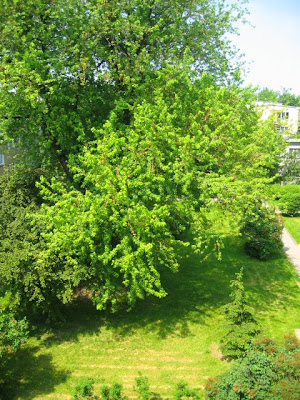Z MOJEGO OKNA

Brooms & the Blue Man

Brooms & the Blue Man
The blue man, as I call him, (the man in the blue jacket and blue cap), is the keeper of the courtyard here. He is the skwer's main man. He not only looks after the greenery (and yellowery) outside, but maintains a constant vigil on the squat blocks themselves cleaning their interiors every so often and organising repairs. The man nearest us is the 'broom man'. It is mid-October and the leaves are falling, and so brooms (here, sans stick) are in great demand. Those infernal leaf blowing machines (yes, the ones that wake you up at 6.30am) are not quite all the rage yet, though they are in evidence. The other guy appears to be a hanger-on, a rail bird, with nothing better to do, along for the ride.
The heart of Kryzstof Kieslowski’s Dekalog in which ten stories are centred in and around Warsaw high-rises was partly influenced by Jozef Robakowski’s ongoing film Z Mojego Okna (From My Window) in which Robakowski, over the course of 21 years from 1978-99, filmed his mostly concreted Lodz 'courtyard' and all its residents.
These vitrinal vignettes on life (below Robakowski's 9th floor flat), from a high-rise which formed part of a complex affectionately known as the Manhattan of Lodz, convinced him that the courtyard had lost all its meaning. He would narrate his videos with a grave dispassionate commentary that amplified his detachment from that which he saw below. At times, he would even sound suicidal from his denunciations of the actions of his fellow blockers.
This is the problem with living nine floors up. The earth below and all its activity seem distant, meaningless, devoid of character any more. The higher you go the less 'courtyard-y' the courtyard becomes and the more the depth charge of mind is likely to go off. The courtyard metamorphoses into something like a well, or a pit, where sounds and smells no longer reach all the way up or down but dissipate into the ether somewhere in between. In losing this sense of sound, and effectively of feeling, one loses a sense of touch with the ground not just physically but metaphysically.
Four floors up however, the earth not only retains its element (with the surrounding blocks harbouring our sense of attachment to it), but the space and all within is positively enhanced by a not wholly horizontal perspective (that is neither wholly vertical) and which literally high-lights the whole courtyard. Granted, the position of one's vantage point is of some import. We also cannot ignore, in the case of Robakowski’s 9th floor prospect, the nature of the courtyard (or lack of it) and the impact of the presence of cars (which does more to court pessimism than instil a sense of wonder).
The following pictures represent just a few 'z mojego okna' onto a carless and tree-filled courtyard in Old Mokotow.
As a footnote to this, and by way of elucidating the title, I find it more than just a little curious that in Polish the word for eye (oko) and the word for window (okno) are almost identical.
These vitrinal vignettes on life (below Robakowski's 9th floor flat), from a high-rise which formed part of a complex affectionately known as the Manhattan of Lodz, convinced him that the courtyard had lost all its meaning. He would narrate his videos with a grave dispassionate commentary that amplified his detachment from that which he saw below. At times, he would even sound suicidal from his denunciations of the actions of his fellow blockers.
This is the problem with living nine floors up. The earth below and all its activity seem distant, meaningless, devoid of character any more. The higher you go the less 'courtyard-y' the courtyard becomes and the more the depth charge of mind is likely to go off. The courtyard metamorphoses into something like a well, or a pit, where sounds and smells no longer reach all the way up or down but dissipate into the ether somewhere in between. In losing this sense of sound, and effectively of feeling, one loses a sense of touch with the ground not just physically but metaphysically.
Four floors up however, the earth not only retains its element (with the surrounding blocks harbouring our sense of attachment to it), but the space and all within is positively enhanced by a not wholly horizontal perspective (that is neither wholly vertical) and which literally high-lights the whole courtyard. Granted, the position of one's vantage point is of some import. We also cannot ignore, in the case of Robakowski’s 9th floor prospect, the nature of the courtyard (or lack of it) and the impact of the presence of cars (which does more to court pessimism than instil a sense of wonder).
The following pictures represent just a few 'z mojego okna' onto a carless and tree-filled courtyard in Old Mokotow.
As a footnote to this, and by way of elucidating the title, I find it more than just a little curious that in Polish the word for eye (oko) and the word for window (okno) are almost identical.
The little side-square, a sort of overflow for the main skwer, accomodates the bulletin board and the many downed maple leaves from the nearby trees (and the odd bicycle too). In front of this, as if I weren't fortunate enough, there is a Thoreauvian garden (below) where the old man and his wife tend their plots with flower and vegetable throughout the year.

The beginning of a new year, and some wonderful weather. You won't be able to see the sparrowhawk that has just settled on a branch of one of the trees in the school yard beyond. All manner of wildlife reveals itself in Warsaw whenever the temperature drops and the ground remains snowbound.
The first week of May brings colour to the courtyard that would make a rainbow jealous.















No comments:
Post a Comment